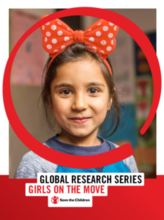Listening to and learning from children is an essential part of Save the Children’s ongoing daily quest to do better for children in the most vulnerable and disadvantaged situations. The importance of taking a participatory approach to understanding what matters in assisting children in migration is borne out of the growing appreciation among migration researchers that migrant-centric research approaches are essential to truly making sense of the changing dynamics of migration patterns, processes and consequences.
Girls remain relatively absent from migration data and qualitative research, despite their high numbers in migration flows. As girls’ experiences remain untold, programmes and policies fail to adapt to meet their needs and protect their rights. Yet, stakes are high for girls on the move. Being children and female, girls experience a significant disadvantage in terms of power, resources, control over their own bodies and access to the public space. This generates greater risks, less access to information and services and less options for safe and legal migration. Still, girls decide or are forced to migrate and demonstrate strong agency and resilience when they do. Girls themselves are the ones best placed to tell researchers and practitioners what their realities look like. As they do, a more nuanced and comprehensive picture of girls on the move will emerge.
The Girls on the Move Initiative is a global series of action research that puts girls at the centre. It has been conducted across different regions within existing Save the Children programmes. Each regional study generates targeted evidence to address knowledge gaps in current literature and programme approaches, and engages Save the Children teams to immediately strengthen ongoing interventions for girls in different stages of migration, notably during transit and arrival. Research for the series was conducted during 2019, in Southern Africa, Latin America and the Balkans. The primary purpose is to recommend evidencebased strategies to improve the relevance and effectiveness of field interventions that target development outcomes for migrant girls, including unaccompanied children.
Reports in this series include:

